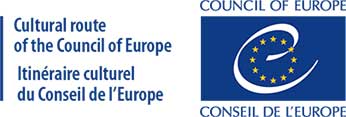
5th Cultural Routes Annual Advisory Forum
Aranjuez, Spain, 29-30 October 2015
Networking for culture and heritage: the Council of Europe’s Cultural Routes - Making transnational connections work
The 5th Annual Advisory Forum was co-organised by the Enlarged Partial Agreement on Cultural Routes of the Council of Europe (EPA), the Ministry for Education, Culture and Sport of Spain, and the European Institute of Cultural Routes in Luxembourg.
The exchanges and discussions held in four thematic workshops contributed to further progress and to identifying and elaborating strategies for the future. Their follow-up have been examined at the 2016 Advisory Forum in Vilnius.
Workshop n.1
The role of international organisations in supporting transnational Cultural Routes initiatives
Participants stressed the importance of finding synergies and avoiding duplication at the international level through joint activities allowing each organisation to contribute to action according to its specific missions, scope and competencies, and encouraged interaction on the ground where UNESCO world heritage sites coincide with cultural routes. A request was made that that donor organisations give due consideration to the Cultural Routes certification in their funding programmes.
Workshop n.2
Tourism promotion of Cultural Routes
This workshop asked the Council of Europe to give due consideration to the communication and promotion of the Cultural Routes programme as a “brand of quality” for all aspects of tourism-related activity. The Council of Europe was asked to consider including a criterion of environmental sustainability as a part of the evaluation of certified routes and candidate projects, and the EICR was encouraged to seek further potential partnerships in the area of sustainable tourism.
Workshop n.3
Young people’s role and involvement in all aspects of the development and communication of Cultural Routes, including the preservation and management of cultural heritage
Participants stressed the importance of cooperation with other Council of Europe youth-related activities, and of the adaptation of activities to new publics and new ways of travelling and visiting, in particular through new technologies and new media. A call was made for the setting-up of a platform for exchange between young people, including an academic database of studies and research, and that the youth dimension be a permanent feature of the annual advisory forums.
Workshop n.4
Democracy and Cultural Routes – cross-cutting participation at local and international levels
Underlining the need for activities to ensure accessibility to culture for the broadest possible public, participants asked the programme’s stakeholders to define, establish and maintain governance tools and formal or informal structures to ensure bottom-up democratic participation, shared responsibilities and efficient governance. Partnerships between the different actors of the programme were strongly encouraged, including, for instance, between cultural routes scientific committees. The workshop underlined the need for the Cultural Routes programme to interact with UNESCO and its advisory bodies.
The Forum was attended by representatives of the 33 certified Cultural Routes of the Council of Europe and candidate projects from all over Europe, representatives from Member States of the EPA, International Organisations (European Union, UNWTO, ICOMOS), NGOs, local and regional authorities, universities and professionals in the sector of cultural tourism.
The Forum’s conclusions are set out in the Aranjuez Declaration adopted by participants at the close of the sessions, which takes stock of the achievements since the 2014 Forum in Baku and sets new goals for the future activities of the Cultural Routes of the Council of Europe Programme.
5th Cultural Routes Annual Advisory Forum Complete Programme
Declaration of the 5th Cultural Routes Annual Advisory Forum
Hotel NH Collection Palacio de Aranjuez
Calle de San Antonio, 22
28300 Aranjuez (SPAIN)



